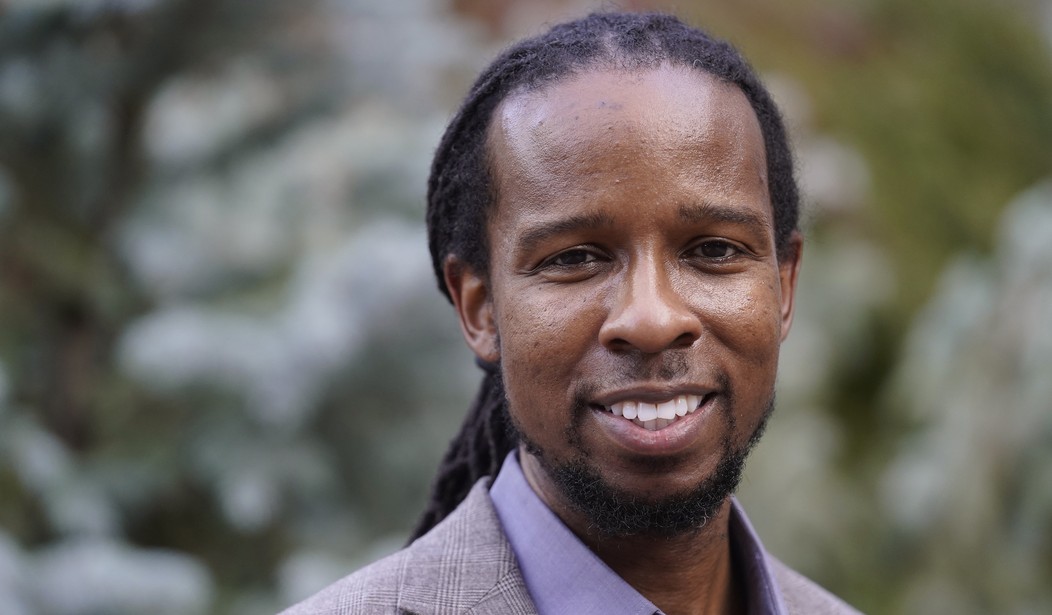Professor Ibram X. Kendi, a proponent of Critical Race Theory (CRT) and author of "How to Be An Antiracist" and "Antiracist Baby," among other books, was called out over Twitter for retweeting and then deleting an article by Christian Spencer for The Hill that refuted a narrative on race and white privilege.
tfw you accidentally blow up your entire life's work in a tweet and have to delete pic.twitter.com/wvxJsAyDsR
— Alex Griswold (@HashtagGriswold) October 29, 2021
"White kids are lying about being black so they can get into college" doesn't make the point Kendi thinks it does. https://t.co/f29ZGHHNfl
— NecroNoamicon (@neontaster) October 30, 2021
Ibram Kendi, the father of “antiracism”, deleted this tweet that I quoted above. pic.twitter.com/7Grl49Ucmm
— Ian Miles Cheong @ stillgray.substack.com (@stillgray) October 29, 2021
The Post Millennial, in an article by Libby Emmons was also able to capture a screenshot of the tweet while it was still up.
"More than a third of White students lied about their race on college applications, and about half of these applicants lied about being Native Americans. More than three-fourths of these students who lied about their race were accepted," Xendi wrote while sharing Spencer's article, "More than a third of white students lie about their race on college applications, survey finds."
As Spencer wrote in his October 21 article:
A survey from Intelligent found that 34 percent of white students who applied to colleges and universities falsely claimed they were a racial minority on their application.
The publication found that 81 percent of students who faked minority status did so to improve their chances of getting accepted. Fifty percent of students who lied said they did it to get minority-focused financial aid.
Most students, 48 percent, claimed to be Native American on their application. Thirteen percent falsely marked that they were Latino, while 10 percent falsely claimed to be Black. Nine percent of those surveyed lied that they were Asian or Pacific Islander.
For the most part, Intelligent found, these white students tended to get away with their lies. About 3 in 4, or 77 percent, of white applicants who faked minority status on their applications were accepted to those colleges.
“While other factors may have played a role in their acceptance, the majority of applicants who lied and were accepted (85%) believe that falsifying their racial minority status helped them secure admission to college,” Intelligent wrote in their report.
The survey was conducted on July 13, with 1,250 white Americans who had previously applied to college.
Recommended
Xendi is completely driven by this anti-racist agenda. As John Stossel wrote in a September column for Townhall, Xendi and Robin DiAngelo, author of "White Fragility," refer to "most every disparity between races 'systemic racism.'"
And yet, as Ben Shapiro highlighted in a June 2 column for Townhall, Xendi can't even properly define what "racism" means:
This week, a clip of America's most prominent racial grifter, Ibram X. Kendi, began making the rounds on Twitter. Kendi, the author of "How to Be an Antiracist," has undoubtedly made a fortune by indicting those who disagree with him as complicit in American racism -- and by providing partial absolution to those who repeat his cultish ideas. In one particular clip from a recent interview, however, Kendi was asked to do one very simple thing: to define racism itself. Kendi failed signally in that task. "I would define it as a collection of racist policies that lead to racial inequity that are substantiated by racist ideas," Kendi stated.
The audience laughed out loud.
Kendi then reiterated his definition and added: "And antiracism is pretty simple using the same terms. Antiracism is a collection of antiracist policies leading to racial ... equity that are substantiated by antiracist ideas."
This, of course, is utterly nonsensical. No term can be defined by simple reference to the term itself. If someone asked you to define an elephant and you quickly explained that an elephant is, in fact, an animal known as an elephant, you would be adding no new information. If someone asked you to describe anger and you then defined anger as the feeling of being angry, you would leave the listener in serious doubt as to your sanity.
Yet the left not only nods along to this; it champions it. For deep thoughts like Kendi's, CEOs pay millions: Jack Dorsey of Twitter gave Kendi's Center for Antiracist Research at Boston University $10 million last year; The Vertex Foundation of Vertex Pharmaceuticals is giving Kendi's center $1.5 million over three years; Bank of America has brought in Kendi to deliver his insipid message; The Boston Globe has teamed with Kendi's center to create a new media platform. To date, the Center for Antiracist Research has generated precisely zero research; its website reads, "We are now accepting proposals for our research and policy teams." The center is also accepting applications for its "Antibigotry Convening." And, of course, the center has merchandise, including Antiracist Book Festival face masks (for just $25!).
As Andy Ngô shared, Kendi is blocking those who dared to share the article.
Ibram Kendi is searching whoever shared this article and is blocking them. https://t.co/CLhUF8cxOm pic.twitter.com/Ln8gkoR6Qf
— Andy Ngô ?????? (@MrAndyNgo) November 1, 2021
Ian Miles Cheong in a Twitter thread where he shared Kendi's now deleted tweet highlights how "white people are disadvantaged."
Can we just admit that white people are disadvantaged? Because they are. Whites are discriminated against, bullied and marginalized. They are told they can’t talk about most topics or hold independent positions without having their lives ruined. Whites have lost the franchise.
— Ian Miles Cheong @ stillgray.substack.com (@stillgray) October 29, 2021
If I was white, I’d be canceled as some sort of “white supremacist” for any one of the previous sentences. Just one sentence. Think about that.
— Ian Miles Cheong @ stillgray.substack.com (@stillgray) October 29, 2021
CRT isn't the only racist danger dividing this country. The Biden administration is particularly preoccupied with the idea of "equity." In June, President Joe Biden acknowledged that the "first executive order I signed was insisting that every one of my cabinet members focus on racial equity."
In the text of the 1,684 page reconciliation text that was just released on Thursday, it is revealed that Pell grants will not be dictated by criteria such as one's race. As the text read, "In awarding grants under this section to eligible entities, the Secretary shall give priority to eligible entities that propose to use a significant share of grant funds to, among students of color, low-income students, students with disabilities, students in need of remediation, first generation college students, student parents, and other underserved student populations in such eligible entity, improve enrollment, retention, transfer, or completion rates or labor market outcomes."

























